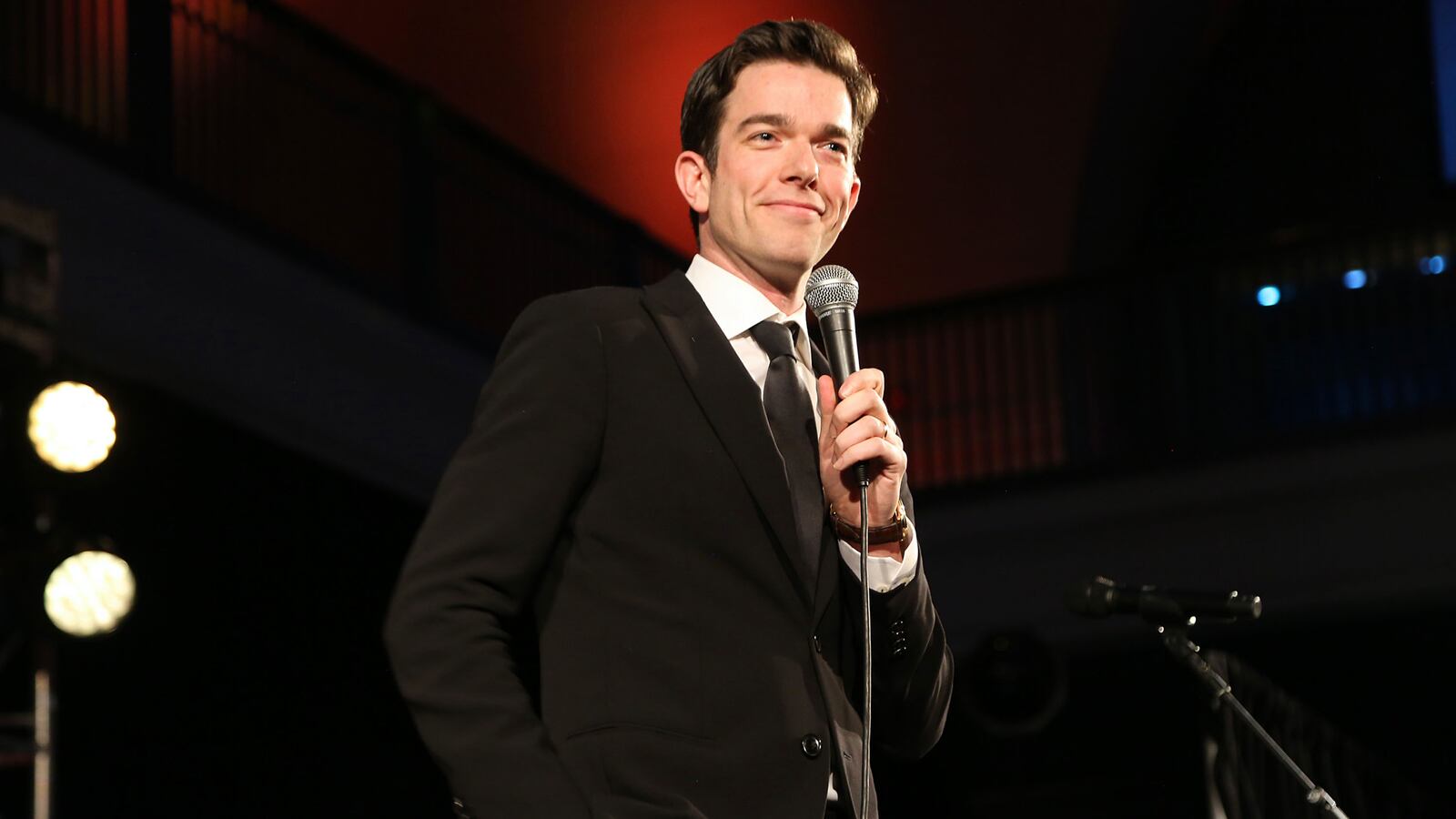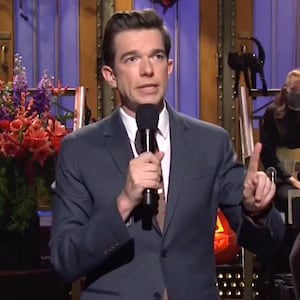It’s funny that people were worried about John Mulaney’s sobriety after he appeared on Late Night last year, the comedian said upon his return to the NBC show Tuesday night. “I had been under the influence the day before—and the day after, I was probably under the influence,” he told Seth Meyers. “But on the show… at your insistence, I was more sober than not.”
After that old episode aired, the comedian remembers just how many people online seemed to think something was wrong with him. “And I was sitting at home going, ‘Indeed, something is.’”
There’s little mystery to why Mulaney would choose Meyers to conduct his first interview after seeking treatment for a relapse with alcohol and cocaine last fall. The two have worked together on a number of projects since their days on Saturday Night Live, and Meyers’ wholesome vibe in many ways mirrors the non-threatening persona that endeared Mulaney to so many in the first place. For nearly 20 minutes, the pair discussed the intervention Meyers and other 40-something-year-old comedians staged, Mulaney’s relationship with Olivia Munn (whom the comedian confirmed is pregnant), and what it’s been like to navigate the past year as a freshly sober person still learning to use their shaky “Bambi legs.”
Horses in hospitals and saucy real estate agents give Mulaney’s specials their unpredictable whimsy, but it’s his frankness about being hungover at his graduation and doing so much cocaine that most of college is a blur that impart the routines with quiet depth. When the comedian first revealed he had relapsed, everyone from fans online to the broader media establishment seemed invested in getting the discussion “right”—in being kind to a comedian whose work speaks to so many, in part, because he has been so consistently vulnerable. But as sensitive as the coverage of Mulaney’s treatment has generally been, his divorce has remained fair game for tabloids and, of course, the judgmental peanut gallery that is Twitter.
As eager as we all seem to be, in a post-Framing Britney Spears world, to avoid maligning celebrities for personal struggles we cannot possibly understand from afar, it’s disheartening to watch Mulaney do damage control while strangers rush to judge decisions he’s made in recovery—choices that he credits with saving his life. At this point “parasocial relationship” is one of Twitter’s favorite buzzwords, and there certainly seems to be an element of projection to the Mulaney-Munn mishegas. But the ire currently surrounding Mulaney also seems to reflect our collective inability to conjure empathy and understanding for people with substance use disorders, and the degree to which the comedian’s own discussion of the subject has been ignored in his broader public image.
Mulaney hasn’t spent a lot of time talking about his domestic life over the years, but the jokes he’s mined from it have come to define his public image. Anna Marie Tendler, the comedian’s wife for six years before their divorce, had become an occasional character in his work, along with their cantankerous French bulldog Petunia, whom he impersonates with the withering croak of a French chain smoker.
Mulaney’s jokes about his relationship are often the ones that reinforce his unassuming persona—from his people-pleasing “Mayor of Nothing” nature, to his inability to command authority even over a small dog, to his childlike excitement over finally getting to use the word “wife.” He also used his marriage as a vehicle to explore and mock sexist comedy tropes: During his third stand-up special, The Comeback Kid, the comedian came for the “bananas-insulting expression” Why buy the cow when you can get the milk for free?—which he ultimately answered with that disarming combination of sincerity and snark.
“Why buy the cow? Because you love her. You really do. And sure, she’s a bossy little Jew, but… she takes care of you. And you don’t wanna be some old man stumbling around, like, ‘Hey, you seen any loose milk?’”
A few years later, in Kid Gorgeous, Mulaney recalled a conversation in which he asked Tendler if he could make fun of her on stage. She consented, he said, as long as he didn’t say that she was a bitch and he didn’t like her. He feigned shock at a trope that’s pervaded male comedians’ acts for years, wondering aloud, “What kind of show would that even be? ‘Hello, my wife is a bitch and I don’t like her!’ That’s like a support group for men in crisis, with keynote speakers Jon Voight and Alec Baldwin.”
It’s not like Mulaney has hidden his alcoholism and cocaine use; he’s discussed those far more often than he has his romantic life. But the “good-guy” pedestal the public discourse propped under the comedian’s feet years ago has also done him a disservice. As anyone who manages a substance use disorder can tell you, America still struggles with the idea that any “good” person can also find themselves addicted to anything. But someone who “overcame” said addiction? That’s the kind of non-existent hero we can all adore.
Sobriety, as Mulaney noted in his conversation with Meyers, is a commitment he must make every day. When asked whether being newly sober is the “hardest version of John Mulaney to be,” he simply replied, “They’re all uncomfortable to be.” At the same time, he expressed at length his appreciation for the “beautiful” connection he’s formed with Munn—whom he credits with supporting him through the “hell” of recovery.
But Munn has already been cast as the Angelina Jolie to Tendler’s Jennifer Aniston; her pregnant belly made headlines in the New York Post. Although comedians’ spouses do not usually achieve enough significance to generate this much anger on their behalf, Tendler is a multi-disciplinary artist who designs Victorian lampshades—possibly the coolest-sounding profession on Earth. Her Instagram feed is a sumptuous combination of product shots and photography that commands a following of its own, including, one imagines, more than a few Mulaney stans who might not want to see the couple split.
At this point the backlash to the backlash has grown just as strong. For every person tweeting that they’re going to dump all of their “anger about all the shitty things men have ever done” onto Mulaney, there’s another wondering how any of us could presume to know what a complete stranger should do with his life.

Olivia Munn attends the Fifth Annual InStyle Awards at The Getty Center on October 21, 2019, in Los Angeles, California.
Randy Shropshire/GettyNow that we’re more than a year into a seemingly endless pandemic, celebrity break-ups and make-ups have become a rare form of familiar escapism. (And the Ana de Armas-Ben Affleck-Jennifer Lopez-Alex Rodriguez love quadrilateral could only sustain us for so long.) But as delightful as it can be to transform famous people’s lives into our own Greek myths, these tales sell best when rendered in black and white—and few people’s stories can accurately be told without at least a little gray.
Toward the end of his sit-down with Meyers, Mulaney pointed out that the crowd he was playing to in his previous appearance was, thanks to COVID-19 regulations, actually an empty room. “That’s me,” he said, pointing to a photo in Meyers’ hands, “playing to a crowd that isn’t there.”
And yet, the illusion is effective. Anyone who wasn’t in the room with Meyers and Mulaney during that original interview wouldn’t know what the reality of their conversation was like, even after it aired for us to watch. It’s TV magic—the kind of editing that stitches together shows like Late Night, The Sack Lunch Bunch, stand-up specials, and every other keyhole most of us will get into Mulaney’s life. To say that Mulaney has “changed” by ending one relationship and starting another implies a level of familiarity viewers will never have with a comedian most of us will never meet. And to claim that any of his choices undo his “wholesomeness” says more about us than it does him.
Maybe instead of trying to rewrite Mulaney’s role in our celebrity mythology (hero or villain, saintly square or lecherous adulterer) we can all simply take him at his word—specifically, the one he chose to sum up his tumultuous year. “You guys saved me from drugs, and Olivia and this baby have helped save me from myself in this early journey out of recovery,” the comedian told his friend. “I don’t have a joke for that. I’m really grateful.”







